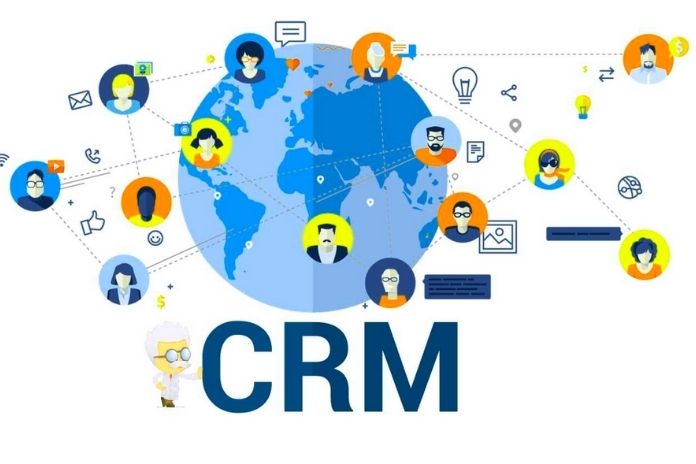CRM is more than customer management software; we are talking about a set of strategies that aim to improve the customer’s experience with a particular brand. Undoubtedly, we are talking about one of the concerns that should keep many entrepreneurs awake at night.
We’ve created this guide on what CRM is and what it’s for to help you take full advantage of this tactic. 93% of service teams agree with the statement that customers currently have higher expectations regarding the experience they will have with the brand. In the same way, research already shows that 56% of customers would stop shopping with a company due to a bad customer service experience.
Therefore, investing in actions that focus on improving consumers’ experience with the brand becomes indispensable in today’s corporate reality. As a result, knowing more about what CRM is and what it is for becomes an immediate need for companies.
What Is CRM, And What Is It For?
CRM stands for Customer Relationship Management and is a business strategy that brings together a list of business practices focused on identifying, solving, and meeting customer needs. CRM actions involve all areas that deal with the customer within a company, especially marketing, sales, and service.
To put all customer management actions into practice, your company will be able to count on a CRM system, which makes it easier to implement these actions that will increase the quality of the customer experience. Through CRM software, the company will be able to gather all information about customers, including:
- stage of the purchase journey,
- history of interaction with the brand,
- consumer profile,
- purchased products and services,
- preferred points of contact,
- payment methods,
- main doubts,
- support requests, and lots of other information.
This information will contribute to the segmentation of communication and the general improvement of the consumer experience.
In practice, every detail presented within a system like this will allow the company to improve its marketing, sales, and service processes, ensuring, among other things, more efficiency and personalization in communication with consumers.
The result is an increase in the quality of the interaction between company and customer. From the concentration and mapping of all information and data about customers and their relationship with the brand, it is possible to identify flaws, bottlenecks, opportunities to improve this relationship, offering, for example:
- faster service channels,
- reducing the average service time,
- creating new service and sales channels,
- offering more segmented communication and more.
In short, the adoption of a CRM system will allow the company to understand more about its customers and, in this way, be able to offer them a better experience.
How To Implement CRM In The Company?
Advancing in our guide on what CRM is and what CRM is for, we come to the stage of implementing the tool in your company’s day-to-day. CRM requires some care before, during, and after implementation like any other system.
SaaS solutions are the most current and suitable for all types of business. Tools of this type are accessed over the internet and do not need to be installed on the computer; they work from the payment of a monthly fee on any device with internet access, as long as the professional has a password and login access.
But, how to implement CRM in the company? Here’s a step-by-step list:
- Implement a CRM culture
- Choose the right CRM tool for your company
- Map and define each step of CRM-related processes
- Train with the team
- Define metrics and make adjustments
- Implement a CRM culture
Do you remember that we said that CRM is not just software but a strategy and a set of best practices at the beginning of this article? Before implementing a CRM system, your company must have a culture focused on customer management, which understands the importance of offering quality service and an excellent experience.
Research already shows that 72% of companies say improving the customer experience is their top priority. Is your company part of this index? Develop a culture that places the customer at the center of all processes, prioritizes their satisfaction, and prioritizes solving these consumers’ needs. It sounds easy, but that includes not making a sale to customers who won’t have their problems solved by your company. Are you ready for this?
If you are prepared, know that your company will gain by:
- reduce the cost of customer acquisition,
- reduce business churn rates (turnover),
- increase ROI,
- extend customer lifetime value,
- increase retention rates and more.
Choose The Ideal CRM Tool For Your Company
There is much software available, and identifying the best sales CRM for your company can be a challenge.
Some crucial points in the selection are:
- identify the type of CRM that best suits your company (strategic is usually the most complete and indicated),
- what is the offer of integration of the CRM in question with other tools, such as email, social networks, chatbots, and more;
- ability to customize the sales pipeline and reports ;
- ease of implementation in the day to day of the company,
- The simplicity of the functional interface and more.
Also, in this article, we will delve deeper into our tips on how to choose the ideal CRM software for your company. Keep reading!
Map And Define Each Step Of CRM-Related Processes
To have accurate results with CRM, it is essential to organize the processes related to the platform step by step. The first step is to organize the stages of the sales pipeline (sales funnel) that will be used to lead to purchase. Establish a step-to-step trigger so everyone knows when a lead should or shouldn’t advance to the next funnel stage.
Also Read: How Can Marketing Help My Business?

